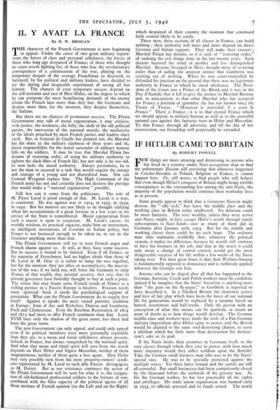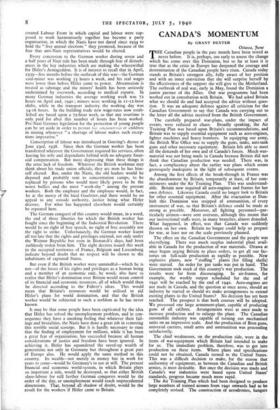IF HITLER CAME TO BRITAIN
By ROBERT POWELL
FEW things are more amazing and distressing to anyone who has lived in a country under Nazi occupation than to find the unfortunate illusion still persisting that whatever happened in Czecho-Slovakia or Poland, Belgium or France, it cannot happen here. Or, still worse, to find people who still believe that even though Hitler's conquest of Britain might bring terrible consequences to the outstanding few among the anti-Nazis, the majority of the population would continue their workaday lives as at present.
Some people appear to think that a victorious Nazism might destroy the "idle rich," but leave the middle class and the working class in Britain today unaffected. No delusion could be more fantastic. The very wealthy, unless they were active anti-Nazis, might, in fact, escape Hitler's wrath through timely subscriptions to Nazi funds—just as many of them did in Germany after January 30th, 1933. But for the middle and working classes there could be no such hope. The ordinary man who maintains wishfully that, whatever the political system, it makes no difference, because he would still continue to have his business or his job, and that at the worst it could only mean a change of central control, would get the most disagreeable surprise of his life within a few weeks of the Nazis taking over. For their great boast is that their Weltanschauung is fundamentally opposed to democracy and is ruthlessly applied wherever the Gestapo sets foot.
Anyone who can be duped after all that has happened to the German, Austrian, Czech and Polish workers must be credulous indeed if he imagines that the Nazis' Socialism is anything more than "the gum on the fly-paper," as Goebbels is reported to have described it. In a Nazified Britain the elemental justice and love of fair play which have been the bases of our national life for generations would be replaced by a tyranny based on hatred, resentment and half-truths. Only the person with no conception of what this means can be apathetic or retain an atom of doubt as to how things would develop. The German middle-class and workers were made the tools of a Pan-German military imperialism after Hitler came to power, and the British would be chained to the same soul-destroying chariot, to serve a nihilism which has little more than destruction for destruc- tion's sake as its goal.
If the Nazis broke their promises in Germany itself, to the very classes through which they rose to power, with how much more impunity would they inflict serfdom upon the British? Take the German small business man who was to be the Nazis' special care. He was to be specially protected against the multiple stores. Yet these latter remain and the cartels are stilt all-powerful. But small businesses had been compulsorily closed by the thousand before the outbreak of the present war. As for the German worker, he has lost practically all his rights and privileges. His trade union organisation was banned early in 1933, its officials arrested and its funds seized. The newly created Labour Front in which capital and labour were sup- posed to work harmoniously together has become a party organisation, in which the Nazis have not dared since 1934 to hold the "free annual elections" they promised, because of the fear that anti-Nazi representatives would be elected.
Every concession to the German worker during seven and a half years of Nazi rule has been made through fear of disturb- ances in the key industries which are making the wherewithal for Hitler's Armageddon. It is of interest to recall that in April, 1939—five months before the outbreak of this war—the German coal-miner was working 53 hours a week, and his real wages were lower than before Hitler came to power. Absenteeism is treated as sabotage and the miners' health has been seriously undermined by overwork, according to medical reports. In many German industries the average working week was 72 hours on April 2nd, 1940; miners were working in 11-12-hour shifts, while in the transport industry the working day was 14-16 hours. In the building trade new wage-rates now estab- lished are based upon a 72-hour week, so that any overtime is only paid for after this number of hours has been worked. Pre-Nazi German legislation for the protection of young people can be set aside in order to permit tne employment ot children in mining whenever "a shortage of labour makes such excep- tions imperative."
Conscription of labour was introduced in Goering's decree of June 23rd, 1938. Since then the German worker has been transferred wherever the Government required his services, often leaving his wife and dependants behind with no adequate finan- cial compensation. But more depressing than these things is the utter lack of freedom. Whatever the British workman may think about his trade union officials, they are men he has him- self elected. But, under the Nazis, the old leaders would be deposed and probably sent to concentration camps, to be replaced by persons who would most likely prove to be the worst bullies and the most " work-shy " among the present workers. Both the employer and the employee would, in fact, be at the mercy of the local Gauleiter, and there would be no appeal to any outside authority, justice being what Hitler decrees. For what has happened elsewhere would certainly be repeated here.
The German conquest of this country would mean, in a word, the end of those liberties for which the British worker has fought since the beginning of the Industrial Revolution. There would be no right of free speech, no right of free assembly nor the right to strike. Unfortunately, the German worker learnt all too late that the rights and privileges enjoyed, not only under the Weimar Republic but even in Bismarck's days, had been ruthlessly stolen from him. The eight decrees issued this week in the occupied territories of France, Belgium and Luxemburg indicate beyond doubt that no respect will be shown to the inhabitants of captured States.
But even if the British worker were unmindful—which he is not—of the losses of his rights and privileges as a human being and a member of an economic unit, he woulo also have to realise that Hitler's domination over Britain would mean control of its financial and economic resources, all of which would then be directed according to the FUhrer's ideas. This would mean that Britain's resources would be utilised to aid Hitler's plans for world domination, and that the British worker would be subjected to such a serfdom as he has never known.
It may be that some people have been captivated by the idea that Hitler has solved the unemployment problem, and in con- sequence they have a sneaking feeling that whatever their fail- ings and brutalities, the Nazis have done a great job in removing this terrible social scourge. But it is hardly necessary to state that the finding of employment for millions, while it has been a great feat of organisation, has succeeded because all human considerations of justice and freedom have been ignored. In achieving it, Hitler has squandered the saved-up wealth of generations not only in Germany but throughout a great part of Europe also. He would apply the same method to this country. Its wealth—not merely in money but in work for years to come—would be Germany's to use at will. The present financial and economic world-system, in which Britain plays so important a role, would be destroyed, so that either British slave-labour for still further German conquests would be the order of the day, or unemployment would reach unprecedented dimensions. That, beyond all shadow of doubt, would be the result for the workers if Hitler came to Britain.































 Previous page
Previous page